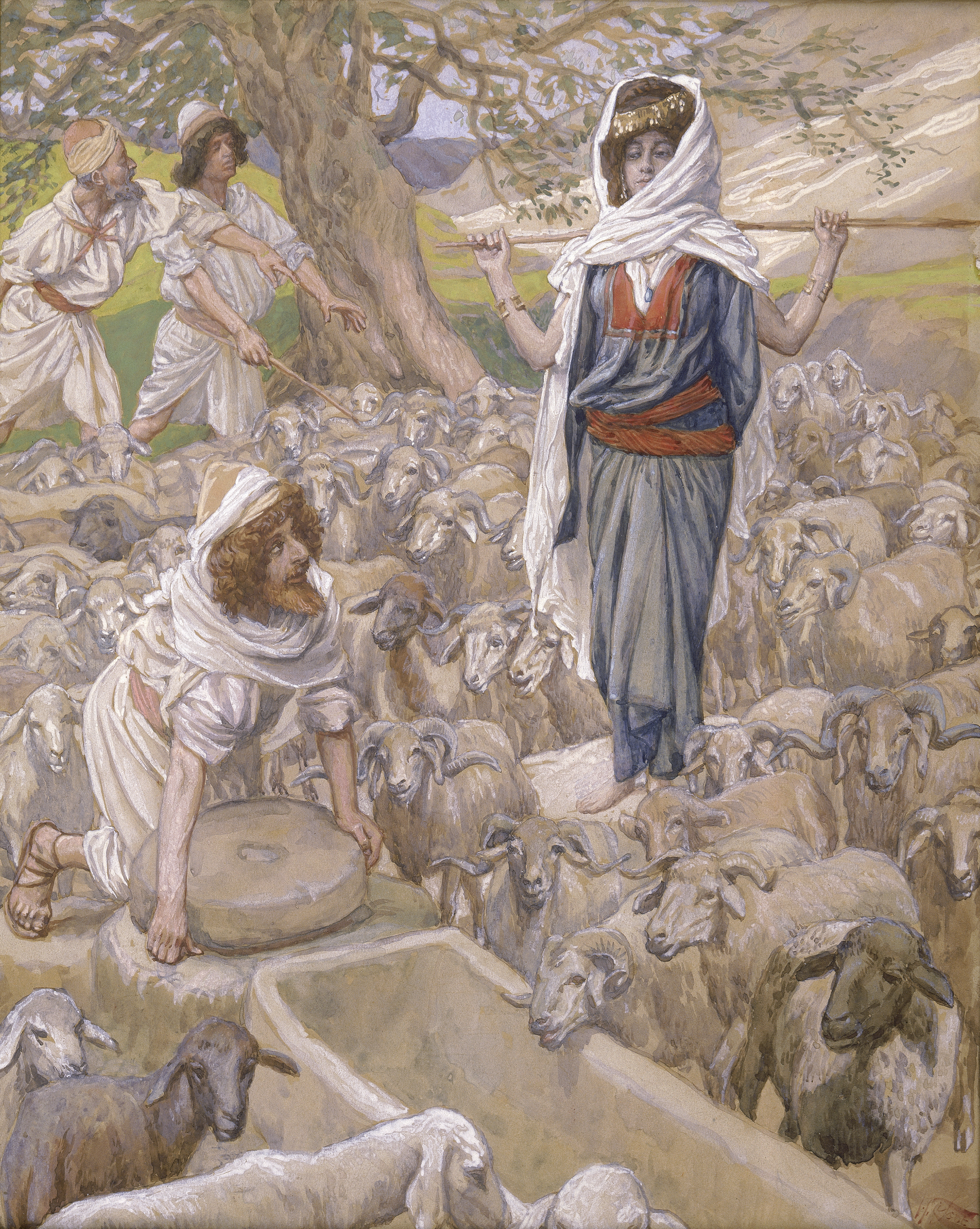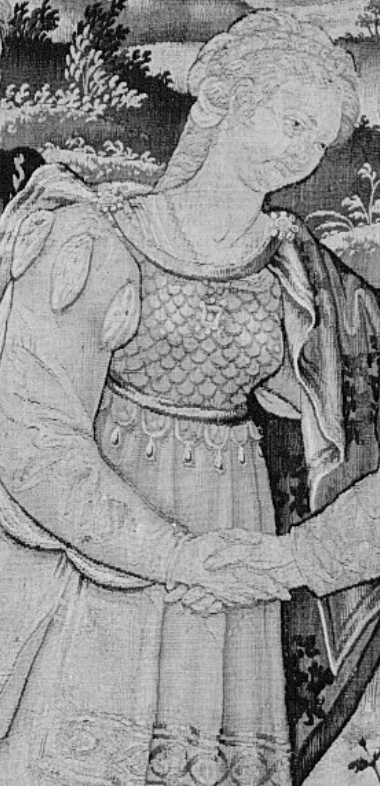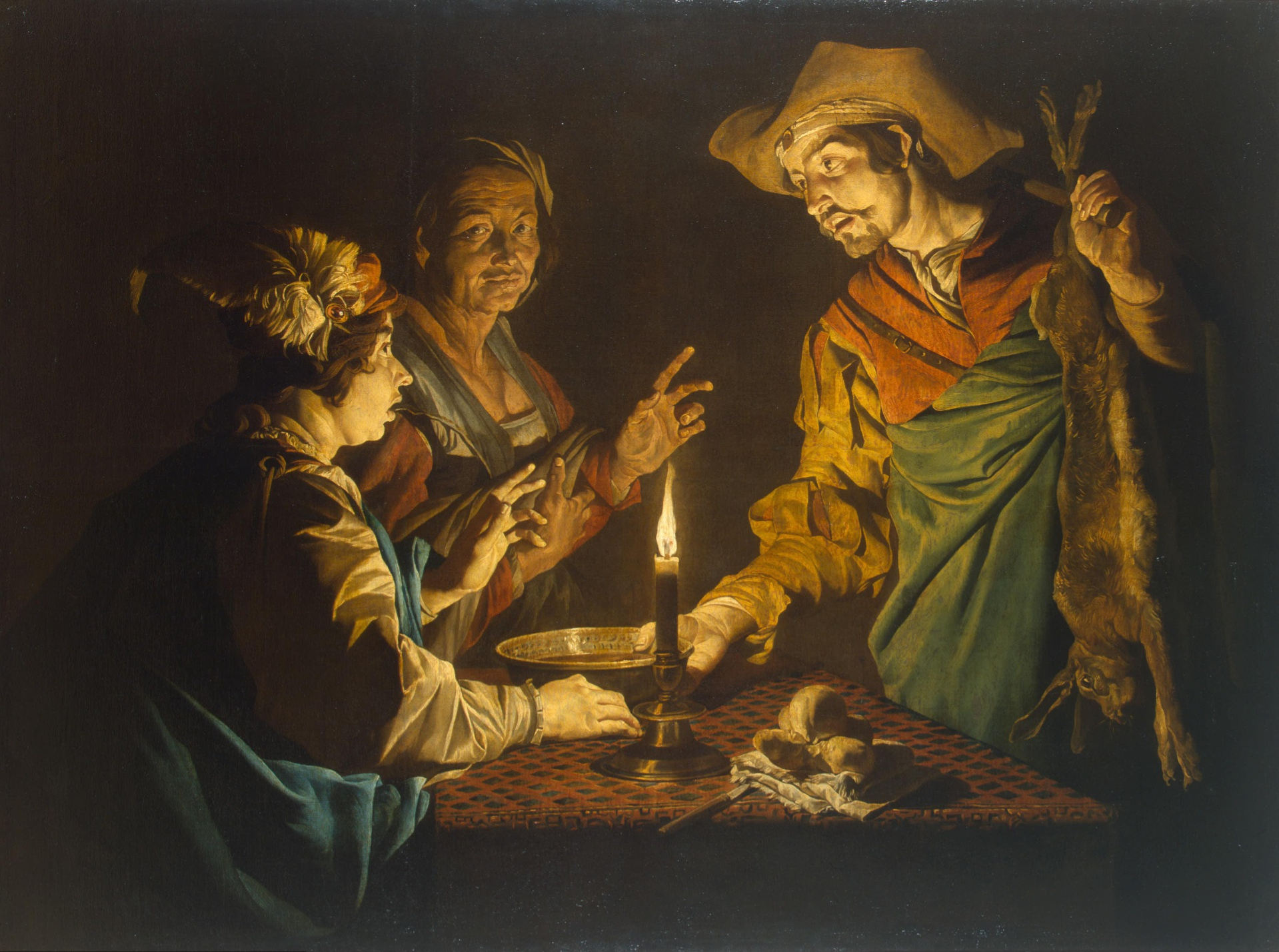|
Leah
Leah ''La'ya;'' from (; ) appears in the Hebrew Bible as one of the two wives of the Biblical patriarch Jacob. Leah was Jacob's first wife, and the older sister of his second (and favored) wife Rachel. She is the mother of Jacob's first son Reuben. She has three more sons, namely Simeon, Levi and Judah, but does not bear another son until Rachel offers her a night with Jacob in exchange for some mandrake root (, ''dûdâ'îm''). Leah gives birth to two more sons after this, Issachar and Zebulun, and to Jacob's only daughter, Dinah. Biblical narrative Overview Leah first appears in the Book of Genesis, in Genesis 29, which describes her as the daughter of Laban and the older sister of Rachel, and is said to not compare to Rachel's physical beauty and that she has tender eyes.) (Genesis 29:17). It is debated as to whether the adjective "tender" () should be taken to mean "delicate and soft" or "weary". Some translations say that it may have meant blue or light color ... [...More Info...] [...Related Items...] OR: [Wikipedia] [Google] [Baidu] |
Jacob
Jacob (; ; ar, يَعْقُوب, Yaʿqūb; gr, Ἰακώβ, Iakṓb), later given the name Israel, is regarded as a patriarch of the Israelites and is an important figure in Abrahamic religions, such as Judaism, Christianity, and Islam. Jacob first appears in the Book of Genesis, where he is described as the son of Isaac and Rebecca, and the grandson of Abraham, Sarah, and Bethuel. According to the biblical account, he was the second-born of Isaac's children, the elder being Jacob's fraternal twin brother, Esau. Jacob is said to have bought Esau's birthright and, with his mother's help, deceived his aging father to bless him instead of Esau. Later in the narrative, following a severe drought in his homeland of Canaan, Jacob and his descendants, with the help of his son Joseph (who had become a confidant of the pharaoh), moved to Egypt where Jacob died at the age of 147. He is supposed to have been buried in the Cave of Machpelah. Jacob had twelve sons through fo ... [...More Info...] [...Related Items...] OR: [Wikipedia] [Google] [Baidu] |
Zilpah
In the Book of Genesis, Zilpah ( he, ''Zīlpā'', meaning uncertain) was Leah's handmaid, presumed slave,In Context whom Leah gave to Jacob like a wife to bear him children (). Zilpah gave birth to two sons, whom Leah claimed as her own and named Gad and Asher (). Zilpah is given to Leah as a handmaid by Leah's father, Laban, upon Leah's marriage to Jacob (see , ). According to the early rabbinical commentary Pirke De-Rabbi Eliezer, Zilpah and Bilhah, the handmaids of Leah and Rachel, respectively, were actually younger daughters of Laban. Zilpah also figures in the competition between Jacob's wives to bear him sons. Leah stops conceiving after the birth of her fourth son, at which point Rachel, who had not yet borne children, offers her handmaid, Bilhah, to Jacob like a wife in order to have children through her. When Bilhah conceives two sons, Leah takes up the same idea and presents Zilpah to Jacob so she can have children through her. Leah names the two sons of Zilpah ... [...More Info...] [...Related Items...] OR: [Wikipedia] [Google] [Baidu] |
Rachel
Rachel () was a Biblical figure, the favorite of Jacob's two wives, and the mother of Joseph and Benjamin, two of the twelve progenitors of the tribes of Israel. Rachel's father was Laban. Her older sister was Leah, Jacob's first wife. Her aunt Rebecca was Jacob's mother. After Leah conceived again, Rachel was finally blessed with a son, Joseph, who would become Jacob's favorite child. Children Rachel's son Joseph was destined to be the leader of Israel's tribes between exile and nationhood. This role is exemplified in the Biblical story of Joseph, who prepared the way in Egypt for his family's exile there. After Joseph's birth, Jacob decided to return to the land of Canaan with his family. Fearing that Laban would deter him, he fled with his two wives, Leah and Rachel, and twelve children without informing his father-in-law. Laban pursued him and accused him of stealing his idols. Indeed, Rachel had taken her father's idols, hidden them inside her camel's seat cushion, and ... [...More Info...] [...Related Items...] OR: [Wikipedia] [Google] [Baidu] |
Mandrake
A mandrake is the root of a plant, historically derived either from plants of the genus '' Mandragora'' found in the Mediterranean region, or from other species, such as ''Bryonia alba'', the English mandrake, which have similar properties. The plants from which the root is obtained are also called "mandrakes". Mediterranean mandrakes are perennial herbaceous plants with ovate leaves arranged in a rosette, a thick upright root, often branched, and bell-shaped flowers followed by yellow or orange berries. They have been placed in different species by different authors. They are highly variable perennial herbaceous plants with long thick roots (often branched) and almost no stem. The leaves are borne in a basal rosette, and are variable in size and shape, with a maximum length of . They are usually either elliptical in shape or wider towards the end (obovate), with varying degrees of hairiness. Because mandrakes contain deliriant hallucinogenic tropane alkaloids and the shape of ... [...More Info...] [...Related Items...] OR: [Wikipedia] [Google] [Baidu] |
Judah (son Of Jacob)
Judah () was, according to the Book of Genesis, the fourth of the six sons of Jacob and Leah and the founder of the Tribe of Judah of the Israelites. By extension, he is indirectly the eponym of the Kingdom of Judah, the land of Judea, and the word '' Jew''. According to the narrative in Genesis, Judah alongside Tamar is the patrilineal ancestor of the Davidic line. The Tribe of Judah features prominently in Deuteronomistic history, which most scholars agree was reduced to written form, although subject to exilic and post-exilic alterations and emendations, during the reign of the Judahist reformer Josiah from 641 to 609 BCE. According to the Christian narrative, he was the ancestor of Jesus. Etymology The Hebrew name for Judah, ''Yehuda'' (יהודה), literally "thanksgiving" or "praise," is the noun form of the root Y-D-H (ידה), "to thank" or "to praise." His birth is recorded at ''Gen.'' 29:35; upon his birth, Leah exclaims, "This time I will praise the LORD/ ... [...More Info...] [...Related Items...] OR: [Wikipedia] [Google] [Baidu] |
Dinah
In the Book of Genesis, Dinah (; ) was the seventh child and only daughter of Leah and Jacob, and one of the matriarchs of the Israelites. The episode of her violation by Shechem, son of a Canaanite or Hivite prince, and the subsequent vengeance of her brothers Simeon and Levi, commonly referred to as ''the rape of Dinah'', is told in Genesis 34. In Genesis Dinah is first mentioned in Genesis 30:21 as the daughter of Leah and Jacob, born to Leah after she bore six sons to Jacob. In Genesis 34, Dinah went out to visit the women of Shechem, where her people had made camp and where her father Jacob had purchased the land where he had pitched his tent. Shechem (the son of Hamor, the prince of the land) then took her and raped her, but how this text is to be exactly translated and understood is the subject of scholarly controversy. (E-book edition) Shechem asked his father to obtain Dinah for him, to be his wife. Hamor came to Jacob and asked for Dinah for his son: "Make marria ... [...More Info...] [...Related Items...] OR: [Wikipedia] [Google] [Baidu] |
Reuben (son Of Jacob)
Reuben or Reuven ( he, רְאוּבֵן, Standard ''Rəʾūven'', Tiberian ''Rŭʾūḇēn'') was the first of the six sons of Jacob and Leah (Jacob’s oldest son), according to the Book of Genesis. He was the founder of the Israelite Tribe of Reuben. Etymology The text of the Torah gives two different etymologies for the name of ''Reuben'', which textual scholars attribute to different sources: one to the Yahwist and the other to the Elohist; the first explanation given by the Torah is that the name refers to God having witnessed Leah's misery, in regard to her status as the less-favourite of Jacob's wives, implying that the etymology of ''Reuben'' derives from ''raa beonyi'', meaning ''he has seen my misery''; the second explanation is that the name refers to Leah's hope that Reuben's birth will make Jacob love her, implying a derivation from ''yeehabani'', meaning ''he will love me''. (This is not mainstream, and has only been suggested by one bible critic. Yeehabani is not ... [...More Info...] [...Related Items...] OR: [Wikipedia] [Google] [Baidu] |
Bilhah
Bilhah ( "unworried", Standard Hebrew: ''Bīlha'', Tiberian Hebrew: ''Bīlhā'') is a woman mentioned in the Book of Genesis.For the etymology, see describes her as Laban's handmaid, who was given to Rachel to be her handmaid on Rachel's marriage to Jacob. When Rachel failed to have children, Rachel gave Bilhah to Jacob like a wife to bear him children. Bilhah gave birth to two sons, whom Rachel claimed as her own and named Dan and Naphtali. expressly calls Bilhah Jacob's concubine, a '' pilegesh''. When Leah saw that she had stopped having children, she took her servant Zilpah and gave her to Jacob like a wife to bear him children as well. The apocryphal Testament of Naftali says that Bilhah and Zilpah's father was named Rotheus. He was taken into captivity but redeemed by Laban, Rachel and Leah's father. Laban gave Rotheus a wife named Euna, who was the girl's mother. On the other hand, the early rabbinical commentary Pirke De-Rabbi Eliezer and other Rabbinic sour ... [...More Info...] [...Related Items...] OR: [Wikipedia] [Google] [Baidu] |
Issachar
Issachar () was, according to the Book of Genesis, the fifth of the six sons of Jacob and Leah (Jacob's ninth son), and the founder of the Israelite Tribe of Issachar. However, some Biblical scholars view this as an eponymous metaphor providing an aetiology of the connectedness of the tribe to others in the Israelite confederation. Name Two different etymologies for the name of ''Issachar'' have been proposed based on the text of the Torah, which some textual scholars attribute to different sources—one to the Yahwist and the other to the Elohist. The first derives it from ''ish sakar'', meaning ''man of hire'', in reference to Leah's hire of Jacob's sexual favours for the price of some mandrakes. The second derives it from ''yesh sakar'', meaning ''there is a reward'', in reference to Leah's opinion that the birth of Issachar was a divine reward for giving her handmaid Zilpah to Jacob as a concubine. Scholars suspect the former explanation to be the more likely ... [...More Info...] [...Related Items...] OR: [Wikipedia] [Google] [Baidu] |
Esau
Esau ''Ēsaû''; la, Hesau, Esau; ar, عِيسَوْ ''‘Īsaw''; meaning "hairy"Easton, M. ''Illustrated Bible Dictionary'', (, , 2006, p. 236 or "rough".Mandel, D. ''The Ultimate Who's Who in the Bible'', (.), 2007, p. 175 is the elder son of Isaac in the Hebrew Bible. He is mentioned in the Book of Genesis and by the prophets Obadiah and Malachi. The Christian New Testament alludes to him in the Epistle to the Romans and in the Epistle to the Hebrews. According to the Hebrew Bible, Esau is the progenitor of the Edomites and the elder brother of Jacob, the patriarch of the Israelites.Metzger & Coogan (1993). ''Oxford Companion to the Bible'', pp. 191–92. Jacob and Esau were the sons of Isaac and Rebecca, and the grandsons of Abraham and Sarah. Of the twins, Esau was the first to be born with Jacob following, holding his heel. Isaac was sixty years old when the boys were born. Esau, a "man of the field", became a hunter who had "rough" qualities that distingui ... [...More Info...] [...Related Items...] OR: [Wikipedia] [Google] [Baidu] |
Zebulun
Zebulun (; also ''Zebulon'', ''Zabulon'', or ''Zaboules'') was, according to the Books of Genesis and Numbers,Genesis 46:14 the last of the six sons of Jacob and Leah (Jacob's tenth son), and the founder of the Israelite Tribe of Zebulun. Some biblical scholars believe this to be an eponymous metaphor providing an aetiology of the connectedness of the tribe to others in the Israelite confederation. With Leah as a matriarch, biblical scholars believe the tribe to have been regarded by the text's authors as a part of the original Israelite confederation. The Tomb of Zebulun is located in Sidon, Lebanon. In the past, towards the end of Iyyar, Jews from the most distant parts of the land of Israel would make a pilgrimage to this tomb. Etymology The name is derived from the Northwest Semitic root ''zbl'', common in 2nd millennium BCE Ugaritic texts as an epithet (title) of the god Baal, as well as in Phoenician and (frequently) in Biblical Hebrew in personal names. The t ... [...More Info...] [...Related Items...] OR: [Wikipedia] [Google] [Baidu] |
Laban (Bible)
Laban (Aramaic: ܠܵܒܵܢ; ), also known as Laban the Aramean, is a figure in the Book of Genesis of the Hebrew Bible. He was the brother of Rebekah, who married Isaac and bore Jacob. Laban welcomed his nephew, and set him the stipulation of seven years' labour before he permitted him to marry his daughter Rachel. Laban tricked Jacob into marrying his elder daughter Leah instead. Jacob then took Rachel as his second wife, on condition of serving an additional seven years' labour. Laban and his family were described as dwelling in Paddan Aram, in Mesopotamia. Though the biblical text itself does not attest to this, rabbinic sources also identify him as the father of Bilhah and Zilpah, the two concubines with whom Jacob also has children (''Midrash Rabba'', Gen. 24). Narrative Laban first appears in the Hebrew Bible in as the grown spokesman for his father Bethuel's house; he was impressed by the gold jewelry given to his sister on behalf of Isaac, and played a key part in ... [...More Info...] [...Related Items...] OR: [Wikipedia] [Google] [Baidu] |




.jpg)



